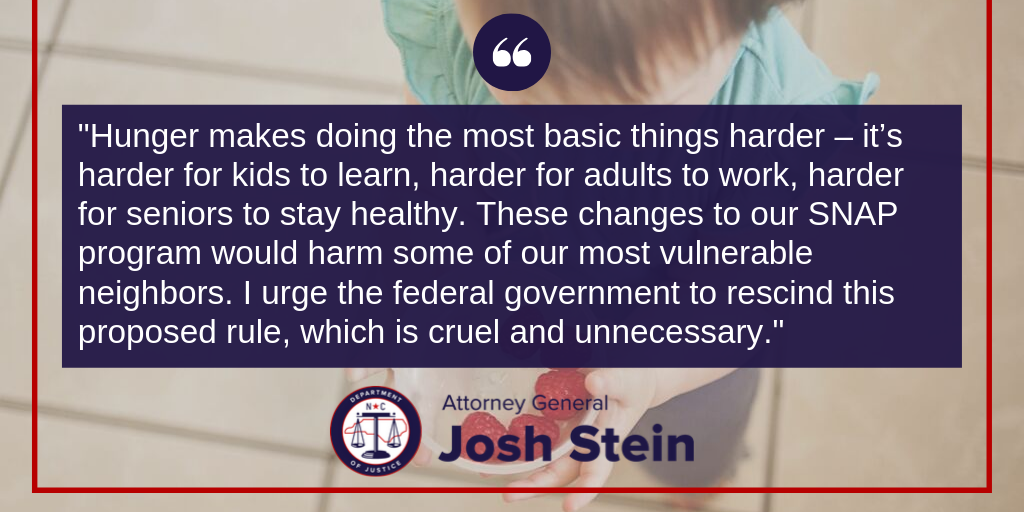
(RALEIGH) Attorney General Josh Stein today opposed the Trump administration’s proposed changes to the Supplemental Nutrition Assistance Program (SNAP), which would take basic food assistance away from more than three million people, disqualify hundreds of thousands of children from free school meals, and punish working families with modest savings. In a comment letter to the U.S. Department of Agriculture, Attorney General Stein and 23 other attorneys general argue that the proposed rule would violate federal law and harm the states, their residents, their local economies, and public health.
“Hunger makes doing the most basic things harder – it’s harder for kids to learn, harder for adults to work, harder for seniors to stay healthy,” said Attorney General Josh Stein. “These changes to our SNAP program would harm some of our most vulnerable neighbors. I urge the federal government to rescind this proposed rule, which is cruel and unnecessary.”
The SNAP program gives people with limited incomes the opportunity to access nutritious food that they otherwise would not have access to and is a crucial part of efforts to help lift people out of poverty. Based on federal guidelines, each state designs its own process for how low-income people can apply for SNAP benefits. The states must track whether participants meet the income and asset requirements for the program on a monthly basis. The Trump administration’s proposed rule would eliminate the long-standing “broad based categorical eligibility” (BBCE) policy that allows states to consider local economic factors – like high costs of living or costs of childcare – when determining SNAP eligibility, and allows states to adopt less restrictive asset limits so that families, seniors, and people with disabilities can have some savings without losing food aid.
This proposed rule is the latest in a series of unlawful attempts by the Trump administration to cut important safety-net programs. The coalition argues in the letter that the proposed rule harms the states by:
- Taking food assistance away from 3.1 million vulnerable people: According to the administration’s own calculations, the rule would cause low-income Americans to lose at least $10.5 billion in SNAP benefits over four years.
- Causing 265,000 children to lose free school meals: Children in households that receive SNAP are eligible for free meals at school. This rule change would mean an estimated 265,000 children would lose access to free school meals, leading to food insecurity and malnourishment. According to studies, food-insecure children are more likely to have learning difficulties and reduced academic performance, stomachaches, frequent headaches and colds, iron deficiency anemia, asthma, and mental health problems.
- Disproportionately taking SNAP benefits from seniors: More than 13 percent of all SNAP households with elderly members would lose food assistance, which could potentially force low-income seniors to choose between paying for necessary medication and food.
- Harming public health and increasing healthcare costs: States’ medical, disability, and other systems will be burdened when people who lose SNAP benefits become food insecure or malnourished. Food insecurity is linked to some of the most potentially costly health conditions such as diabetes, obesity, and complications in pregnancy. Studies have shown that SNAP is associated with better health and, correspondingly, reduced health care costs.
- Harming state economies: SNAP benefits are provided to low-income individuals with immediate spending needs, and SNAP boosts local economies by increasing consumer demand, injecting money directly into the economy, creating jobs, and supporting national and local retailers and the food industry generally. If 3.1 million people lose SNAP benefits, these cuts will have negative ripple effects across the nation’s economy.
- Increasing administrative burdens on states: The Government Accountability Office has consistently found that polices like the BBCE can save state and federal resources and improve productivity. The proposed rule will eliminate these efficiency gains and increase administrative costs—and every dollar that states spend on administrative costs is money taken away from needy families.
Attorney General Stein is joined in sending today’s letter by the Attorneys General of the District of Columbia, New York, California, Colorado, Connecticut, Delaware, Hawaii, Illinois, Kentucky, Maine, Maryland, Massachusetts, Michigan, Minnesota, Nevada, New Jersey, New Mexico, Oregon, Pennsylvania, Vermont, Virginia, Washington, and Wisconsin.
A copy of the letter is available here.
Contact:
Laura Brewer (919) 716-6484
###
